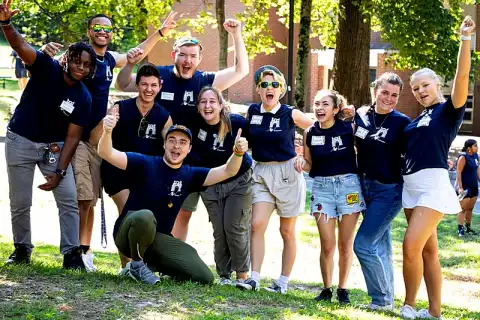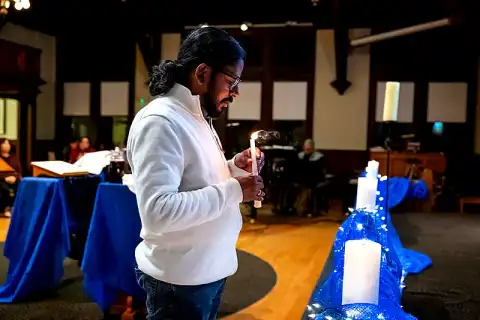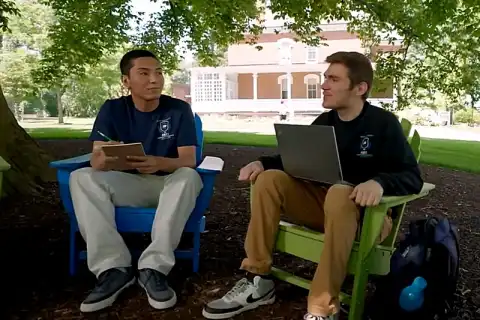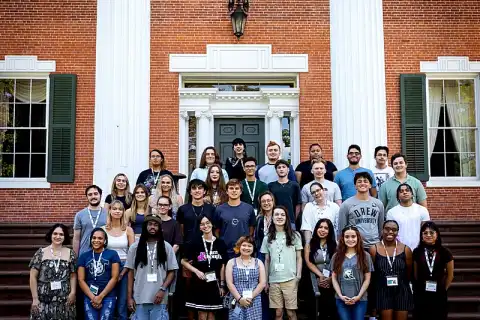Bachelor of Arts - Religion
- 2 years
- Duration
- 50,190 USD/year
- Price
- Rolling admission
- Start
- Rolling admission
- Deadline
- Bachelor
- Degree
- Campus
- Format
- Madison / USA
- Location
- Drew University
- School
Program description
Seeking to comprehend international history and its influence on contemporary events through global comparative analysis and an understanding of ethical principles and practices? Drew's interdisciplinary comparative religion major equips students who identify as globalists to comprehend diverse perspectives on contemporary issues in the U.S. and globally, facilitating informed discourse and decision-making aimed at sustainable solutions.
Program structure
I. Required Courses
- Introduction to World Religions
- Cultural Diversity: Cultural Anthropology and Linguistics or Introduction to Ethics
- Religion in Conversation
- Capstone Independent Study in Comparative Religion or Specialized Honors
II. Experiential Learning
- Internship Project
Other experiential learning opportunities, such as Community-Based Learning courses, may be substituted in consultation with the adviser.
III. Electives
Students must distribute their electives among the four areas below, choosing at least one course from each area. Only one elective course may be at the introductory-level, and at least three of the courses chosen must be at the upper-level.
Histories:
- Greek and Roman Religions
- The Jewish Experience: An Introduction to Judaism
- Introduction to Islam
- Selected Topics in the History of Religions
- History of the Islamic Middle East, 600-1800
- History of the Modern Middle East
- lntroduction to South Asia in Modern History
- lntroduction to East Asia in Modern History
- History of Ancient and Medieval Philosophy
- Forms of Humanism: Renaissance to Enlightenment
- World Christianity
Media, Art, and Music:
- Classical Mythology
- Native Arts and Archaeology of Latin America
- Islamic Art
- Medieval Art
- Italian Renaissance Art
- Baroque and Rococo Art
- Spirituality, Gender and the Media
- History of African-American Church Music
- Music of the World’s Religions
- Bible and Film
Identity, Culture, and Power:
- Anthropology of Religion
- Native North American Cultures
- Society and Social Change in Sub-Saharan Africa
- Muslims and the West
- Sociology of Religion
- Women in Asian Traditions
- Global Women’s History
- Ethics and Society
- Transnational Feminisms
- Religion and Society
- Religions and Food: Feast, Fast, Farming and Famine
- The Search for the Good Community
- Faith Communities and Gender Violence
Philosophy, Theology, and Ethics:
- Classical Morality and Religious Ethics From Plato to Machiavelli
- Utopia and Dystopia
- Mindfulness: History and Practice
- Introduction to Philosophy
- Introduction to Ethics
- Philosophy of Religion
- The Shattering of Reason: From Hegel to Nietzsche
- Business Ethics
- Bio-Medical Ethics
- Systematic Theology
- Confucian and Taoist Religious Thought
- Biblical Literature I: Torah, Prophets, Writings
- Biblical Literature II: Gospels, Epistles, Apocalypse
- World Wisdom for Conflict Resolution
Price
Tuition fee: 50,190 USD/year
Requirements for applicants
Academic entry requirements
- Secondary or high school diploma
- Additional materials may also be required
- Minimum GPA equivalent: 3.0
English language requirements
- TOEFL iBT: 80 (18 in all subscores)
- IELTS: 6.5 (6.0 in all subscores)
- Duolingo: 105
- Academic English: Level 6
- PTEA: 53
About the university
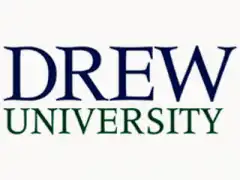
Drew University was founded in 1867 and celebrated its sesquicentennial in 2017. The university consists of three schools: the College of Liberal Arts, the Theological School and the Caspersen School of Graduate Studies. Drew is situated on a lovely, forested campus in Madison, New Jersey, a flourishing little town near New York City.
Drew's one-of-a-kind, cutting-edge path to an undergraduate degree, Launch platform, guarantees that every student graduates with a purpose, sought-after transferable skills, a mentor network, and an experience-based résumé. Drew's distinctive, immersive learning experiences include professionally-mentored scientific research in RISE and DSSI, volunteer and community-based opportunities through the Center for Civic Engagement, making industry connections over seven semesters in New York City, and exploring the world through eye-opening international study abroad trips.
Drew University's two graduate schools provide ten master's and four doctorate degrees. There are several certificate programs available. All programs are built on Drew's well-known dedication to faculty-student mentoring, chances for out-of-classroom experiential learning, and fostering a strong intellectual and global community, with many programs available in hybrid or totally online formats.

